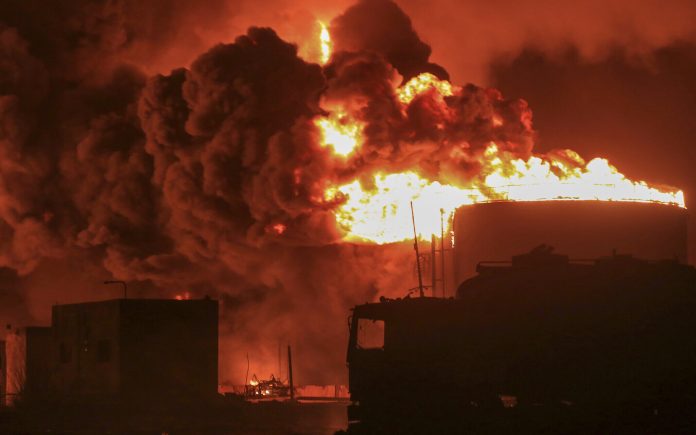Israel escalated its military operations across the Middle East on Sunday, launching airstrikes on Houthi targets in Yemen and continuing bombardments in Lebanon, two days after the killing of Hezbollah leader Sayyed Hassan Nasrallah.
The strikes on Yemen’s Hodeidah port were in retaliation for recent Houthi missile attacks on Israel.Yemen is home to Houthi militia, who like the Hezbollah terrorists have been attacking Israel for the last several months. Israeli officials expressed concern that the regional conflict could spiral out of control, potentially involving Iran and the United States, its key ally.
The Houthi-controlled health ministry reported that four people were killed, with 29 others wounded in the strikes on Hodeidah.
Simultaneously, Israel intensified its offensive in Lebanon. After weeks of escalating airstrikes, Israel has now killed several key Hezbollah leaders and displaced hundreds of thousands of civilians. Lebanon’s Health Ministry reported 105 deaths from Sunday’s strikes alone, including 32 casualties in Ain Deleb in the south and 33 in the Baalbek-Hermel region. Fourteen medics were also killed over the past 48 hours due to Israeli air raids.
Despite mounting casualties, Israel vowed to sustain its military actions. “We need to keep hitting Hezbollah hard,” said Israeli military chief Herzi Halevi.
Israeli drones hovered over Beirut throughout the night and into Sunday, punctuated by the sound of explosions from continued airstrikes. Hezbollah and Israel have been locked in near-daily exchanges of fire since the start of the Gaza war, following the October 7 attack by Hamas. Meanwhile, Yemen’s Houthi fighters have periodically launched attacks on Israel and disrupted shipping in the Red Sea.
Israel’s defense officials have indicated plans to widen the offensive, aiming to secure its northern borders and allow residents to return to their homes. The assassination of Nasrallah, who led Hezbollah for over three decades, has dealt a significant blow to the group, though Hezbollah responded with renewed rocket fire. Iran, which backs Hezbollah, has vowed to avenge Nasrallah’s death.
U.S. President Joe Biden has called for diplomatic efforts to resolve the conflict in Lebanon but has also positioned U.S. military forces in the region. In an attempt to stave off a broader war, Biden emphasized that it “has to be” avoided and plans to hold talks with Israeli Prime Minister Benjamin Netanyahu.
According to U.S. Senator Mark Kelly, Israel used a 2,000-pound American-made guided bomb to eliminate Nasrallah. In Iran, officials mourned the loss of a senior Revolutionary Guards officer killed alongside Nasrallah, while Tehran pushed for a U.N. Security Council meeting to address Israeli actions.
Lebanon’s Mounting Casualties
Nasrallah’s body was reportedly recovered intact after Friday’s airstrike, though Hezbollah has not yet announced plans for his funeral. Having built Hezbollah into a powerful domestic force and a key player in Iran’s regional strategy, Nasrallah’s death marked a turning point for the group.
On Sunday, some Lebanese mourned their fallen leader. “We lost the man who gave us strength and hope,” said Sophia Blanche Rouillard, a Christian resident of Beirut.
Lebanon’s Health Ministry reported over 1,000 deaths and 6,000 injuries in the past two weeks, without specifying how many of the casualties were civilians. The ongoing conflict has displaced roughly one million Lebanese—nearly a fifth of the country’s population.
In Beirut, families who fled their homes sought refuge in public spaces like Zaitunay Bay. “We won’t leave. This is our country and we’re staying,” declared Francoise Azori, a displaced Beirut resident.
The United Nations World Food Programme launched emergency relief efforts, while Saudi Arabia and France pledged to send medical aid.
Israel’s Military Campaign
The Israeli military reported dozens of strikes on Hezbollah positions in Lebanon, including weapon storage sites and rocket launchers. Israeli forces also intercepted projectiles fired from Lebanon and the Red Sea.
Additionally, Israel launched widespread airstrikes on Yemeni infrastructure, targeting power plants and ports at Ras Issa and Hodeidah, accusing the Houthis of working under Iranian direction.
“Our message is clear—no place is too far for us,” said Israeli Defense Minister Yoav Gallant.
Nasrallah’s death followed weeks of heavy attacks on Hezbollah’s communications network, presumed to be an Israeli operation. Hezbollah’s extensive arsenal has long been a point of contention in Lebanon, with critics accusing the group of pulling the country into regional conflicts.

